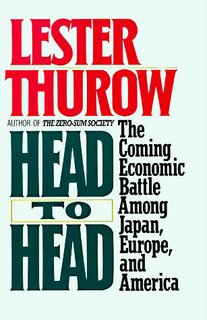
Head to Head: The Economic Battle Among Japan, Europe, and America
Thurow...old but still relevant
Actually this book's original publication date is not 2003, and even if it actually is, then it was based on a ten year old manuscript.
Thurow was writing from the perspective of an IMF and World Bank led globalisation effort, even if they refuse to admit it, those hallowed halls (some of which have changed their game plans as often as Greek freighters change names) have made a mockery of economic reform plans, on the backs of the world's poor. Of course Thurow never said that either. For example, he never mentioned how closely US currency exchange rates could quickly devaluate as the ruble did in defiance of IMF dictates to eliminate 70% of American held foreign debts overnight on any day.
What then did he do wrong with this book? Well, for starters his interests and dire warnings regarding US trade deficits and balance of payment deficiencies were being written about approximately a decade too early for his critics to actually visualize what he was talking about. Reviews of his book on Amazon.com tend to pan him for bad modeling. Too bad they were not exacly right. Thurow did a good job of linking massive US debt and federal overruns to the sanctions and tariffs that would be required to boost exports. Productivity is not the only issue in that case. The billions of dollars lost by foreign exporters as a result would dry up foreign export growth, and dry up US treasury bonds purchases.
Then, the Clinton era was not so much good US business management as a root source of American growth from Thurow's point of view. It was the sale and purchase of US assets at home and abroad. Rather, the similar effects of localization of value-added facilities to secondary or third tier production. He and others have often believed that the trade deficits of US global growth have been the engines of globalisation and the prime reason the IMF and World Bank exist? To design and maintain US imports to drive consumption up and up. It would all work except fewer and fewer nations, the US included, are even considering following their own traditional trade patterns.
Another failure of Thurow's perspective was only a passing regard for China as a peripheral battlefield for US, European, and Japanese competition. Clearly, the growth China continues to insist is unstoppable is correspondant to a nervous decline in exports in traditional markets of his examined troika. But Thurow's solutions for what ails the US, might better have been included as a discussion of each chapter on a chapter by chapter basis. By the end of the book, the cumulative decline of all three players is evident in the present, one is able to reflect clearly on what his analysis had wrong, and it continues to be the failure of the western cultural perspective to adapt orthodox methods of sustainable economic growth and learn only from the current innovators.
As Japan illustrates innovation of supply side economics, Europe illustrated union and management cooperation versus America's consumption patterns which everyone insists are at the end of the road, like GM for example. Now if this economic giant might look again at the crystal ball and figure out how the world's economic leaders could have all three dynamics at the same time. That would be an economic show stopper. The question is...does China have all of those fundamentals? In that case, will it represent a cyclical rise and fall of another new entrant to the export growth led game?
Read Thurow for how well he defines the current big three players, and how his silence on a fourth...leaves it up to the reader to imagine who or where that fourth will appear. China could again slide on many thorny issues, such as labour laws, oil supplies, infrastructure, and artificial market stimulations, not to mention a fading but still possible sanction and tariff barrier wall unseen since the Cold War Era. Thurow may have written on China already? He really missed the boat on Chinese income patterns. He failed to evaluate the effect of foreign entry and speculations in the major centres anyway. Somewhere I am sure there are still many more millions living in Thurow's China.
No comments:
Post a Comment